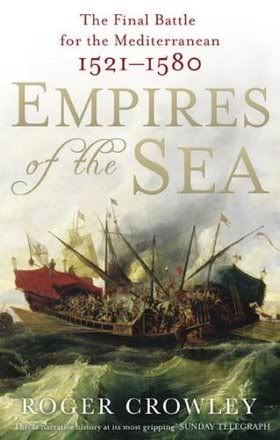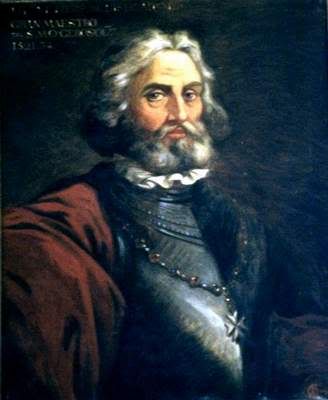1.) EMPIRES OF THE SEA. By Roger Crowley.
 This rich book deals with a crucial Mediterranean timeframe encompassing the better of the sixteenth century, more precisely from 1521 to 1580. If, like me, you hadn't up until this point cared much for what precisely happened then between the Straits of Gibraltar and the Levant, you'll ask yourself, before you're through, how on earth your knowledge of these portentous events was at best limited to a vague awareness of the first Siege of Vienna and the naval battle of Lepanto.
This rich book deals with a crucial Mediterranean timeframe encompassing the better of the sixteenth century, more precisely from 1521 to 1580. If, like me, you hadn't up until this point cared much for what precisely happened then between the Straits of Gibraltar and the Levant, you'll ask yourself, before you're through, how on earth your knowledge of these portentous events was at best limited to a vague awareness of the first Siege of Vienna and the naval battle of Lepanto.There was far more than Lepanto, and "our" protagonists, deserve not only our attention but also our unfaltering respect and gratefulness - even half a milennium on. Broadly speaking the book is structured around three pivotal battles: the Siege of Rhodes, the Siege of Malta, and the Battle of Lepanto. Empires of the Sea is a compelling chronicle of the 60-year long assaults the Ottoman Empire hurled at the Christian "West" with the aim of becoming master of the Mediterranean. In the end, they did not. Or only partly, and then only in the east. Much of the warfare consisted of Turkish armies transported by galleys across the sea to conquer isolated Christian fortresses (Rhodes, Malta's forts, Famagusta), while there is basically only one true naval battle, at Lepanto in 1571. The military encounters of the first kind - the storming of the forts - all look alike. Pathetically small Christian garrisons withstand a ten- or even twentyfold strong adversary of Janissaries (Ottoman crack troops) and merciless and incessant bombarding by Turkish guns. Sieges last weeks, months, in the case of Famagusta even almost a year. Sometimes, against all odds, the Christians hold out (the key forts on Malta), most of the time they do not (Rhodes, Fort St Elmo on Malta, Famagusta). A recurring theme is the apalling cruelty time and again displayed by the Turks, culminating in the flaying alive, after his capture at the end of the Siege of Famagusta, of Marco Antonio Bragadin, the garrison's famous Venetian commander. Curious parallels with today's struggle against islam are:
a.) "our" side today, like then, has a hard time tomake a united stand. The lukewarm enthusiasm of most NATO countries to contribute troops in Afghanistan eerily resembles the unwillingness of the Christian nations at the time to come to the aid of the small beleagured holdouts on tiny island specks across the Mediterranean.
b.) Today, like then, muslim troops are no match for western ones in a conventional battle. Even if one discounts the apparently inflated estimates (by muslim and christian chroniclers alike) of Ottoman troops, one cannot escape the fact that the Christian troops were always facing impossible odds. Yet they inflicted horrendous casualties on the Turks. Had there been numerical parity, or even a less severe disparity, the former would have literally smashed the latter. Now the Turkish victories were often Pyrrhic ones, a fact that undoubtedly contributed to the appalling cruelties meted out to the Christian survivors after they surrendered.
Empires of the Sea leaves much to ponder, compelling one to "connect the dots". The treated time frame, give and take sixty years in the sixteenth century, is far too long ago for the average European citizen to see it as anything else than an incomprehensible forgotten conflict. Even if he or she is aware of it - and those are very few - the reflex will almost always be along the line of the famous "Don't mention the war" attitude the British in their seventies sitcoms and comedy shows reportedly assumed whenever meeting Germans. To dwell on the relentless Turkish assaults, especially in the presence of Turks, will be seen as tasteless nitpicking at best, and racist scaremongering at worst. However, Turkey, the successor to the Ottoman Empire, is now being led by a man who has almost singlehandedly turned what appeared to have become a modern secular democracy, into a second Iran in the making. And whereas we have forgotten who La Valette, Bragadin and Venier are, Turks damn well do recall Suleiman, Turgut and Piyale. We would do well to delve some more into this neglected field of study - scrapping some classes of cultural awareness and sensitivity training in favor of history classes for our youths would be a good start. Especially when you consider that:
A.) PRIOR to the 16th century clashes in the Mediterranean there were:
Almost three centuries of incessant incursions in the Byzantine Empire by the Ottoman Empire's predecessor, the Great Seljuq Empire, which greatly reduced Byzantine territory, it losing most of its hold on Anatolia...
... and two more centuries of war with the Ottoman Empire, culminating in the Fall of Constantinople in 1453 and the annihilation of that great Christian successor to the Roman Empire, after which followed a first, unsuccessful attempt to conquer Rhodes, the island of the Knights of the Order of St. John, in 1480.
B.) THEREAFTER were:
the Long War (1593-1606) between the Ottomans and the Habsburgs, the Taking of Crete in 1669, incursions in Polish-held southern Ukraine and, of course, the Siege of Vienna in 1683. Then there followed a long period of decline characterized by internal strife, a.o. mutinies by the Janissaries Corps, mostly flawed attempts to modernize, the Empire trying to reassert itself in the face of upcoming nationalistic movemements in Serbia and Greece etc... so that towards the end of the nineteenth century the Ottoman Empire had become "the sick man of Europe". Not being able anymore to launch grand scale offensives against powerful Christian nations, it contented itself with the crushing of nationalistic revolts and early pogroms against Armenians. During and after World War I, in which Turkey only found herself on the side of a western nation, Germany, by what would prove to be a stroke of bad luck, the armed hostility against anything Christian continued on its own territory, resulting in a.o. the Armenian Genocide (1915-1917) and the Massacre of the Greeks in Smyrna (1922).
Thus... essentially the history of the land we know today as Turkey can be summarized in a milennium long quasi permanent state of warfare against the Christian Foe, and Crowley's account of the Ottoman Empire at war with that foe on the peak of its power serves merely as a study in microcosm of a 1,000 year War Against The Infidel. Westerners tend to think in timeframes of days, weeks, months and years. How many of us still know what the Falklands War was about? The Suez Crisis??? Instead, our "enlightened" elites who harbor already the thought that Churchill was indeed some kind of warmonger, and who can impossibly be suspected of knowing who John III Sobieski was or what happened in Vienna in 1683, get all warm and fluffy with the thought of incorporating a nation into the EU that has a milennium long history of fighting their more rational predecessors, and congratulate themselves with their statemanship and moral superiority over archaic skeptics.
Turks however think in timeframes of centuries and milennia. In Ankara a clique which has scratched the thin disguising veneer of modernity off the ONLY islamic state which has ever waged war with a degree of success with the Christian West, is preparing itself for a bloodless entry into a continent that hundreds of thousands of Janissaries, if not millions of them, were unable to conquer by force. You can be absolutely certain that THEY know what happened in Vienna, and you can also be absolutely certain that they are far more aware of the historical importance of certain data, for instance that Turkish invasion force was ingloriously chased from the island of Malta in 1565 on a certain 11th of September, and that their Siege of Vienna in 1683 was broken on also a certain 11th of September. WE are being reigned by foolish ignoramuses who think a Trojan horse is a funny accessory in a Brad Pitt movie. THEY are being reigned by a guy who holds the view that Turkish minarets are bayonets and mosque domes helmets... and that democracy is like a bus you take to get somewhere, whereupon, once having arrived, you step off it. If Suleiman the Great would be able to look down from his heavenly harem, he'd nod approvingly.
I am hearing that France is currently holding a Grand Debate about Frenchness. It seems François and Julie are a bit uncertain of themselves and are looking for their inner self.
I would strongly suggest they get themselves a French copy of Empires of the Sea (I don't expect most of them to be very proficient in English, though they seem to make progress in arabic lately) and learn about a famous contemporary of theirs, a certain Philippe Villiers de l'Isle Adam, Grand Master of the Order of the Knights of St. John and last ruler over the Christian stronghold of Rhodes.

Fifty-seven years old, he arrived on his post in 1522 only days before the Turks began menacing the fort. With 600 knights and perhaps three thousand mercenaries and auxiliary troops he held a force of in excess of 100,000 (some sources say 200,000) Turks at bay, and inflicted such enormous losses on them that they were on the verge of giving up. Exhausted, and eager to spare the civilian population of Rhodes further horror, he finally surrendered after a siege lasting half a year. He then led the Order, after several years of seeking for a decent location, to its quintessential homebase of Malta, and henceforth his troops would be known as Maltese Knights. There he died on 21 August 1534. Voilà un homme.
I fear that if Philippe Villiers de l'Isle Adam would be able to look down from Heaven to what has become of his France, he'd shed bitter tears.
Get that fucking book. This applies for non-Frenchmen too godammit.
MFBB.
No comments:
Post a Comment